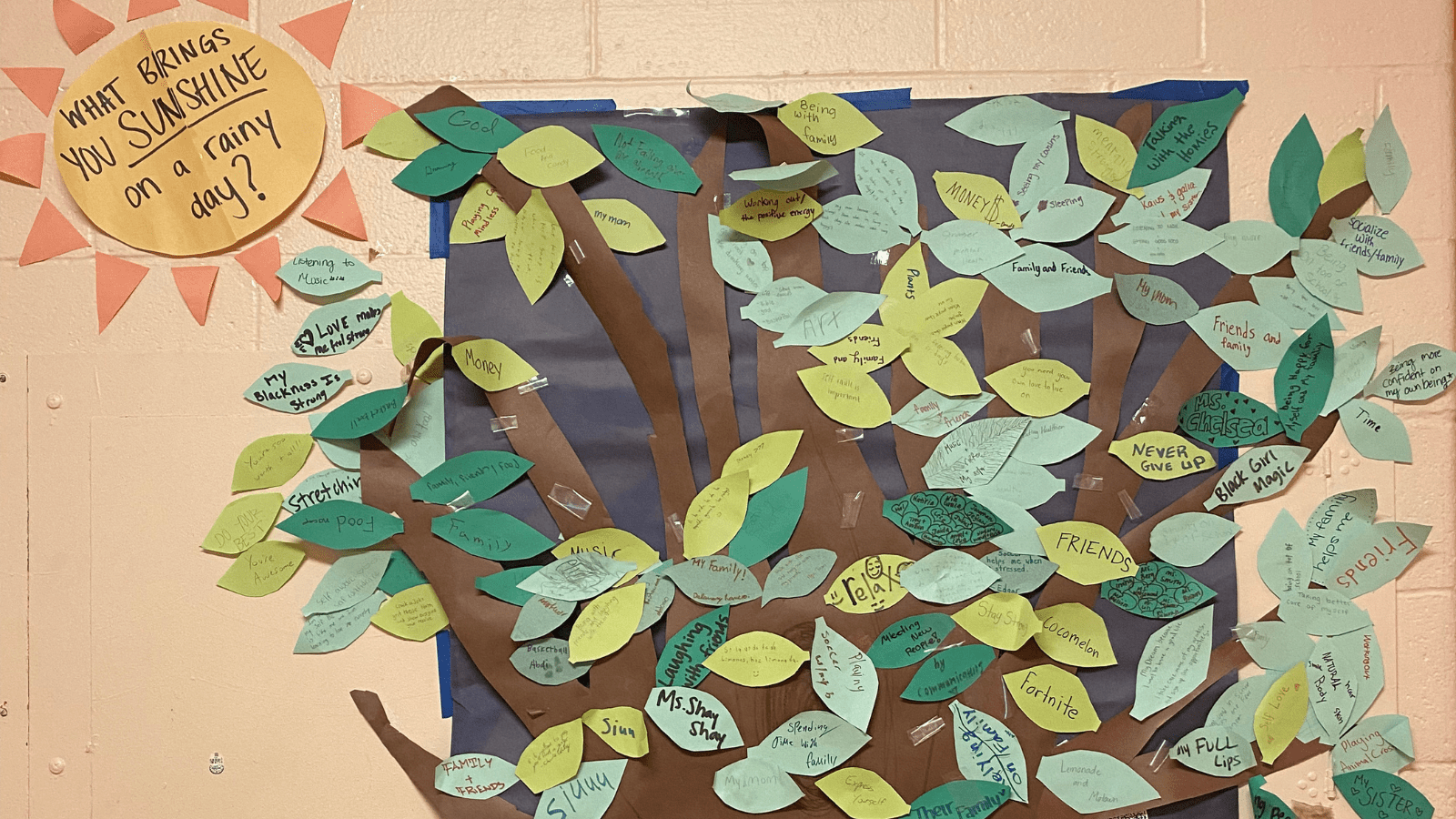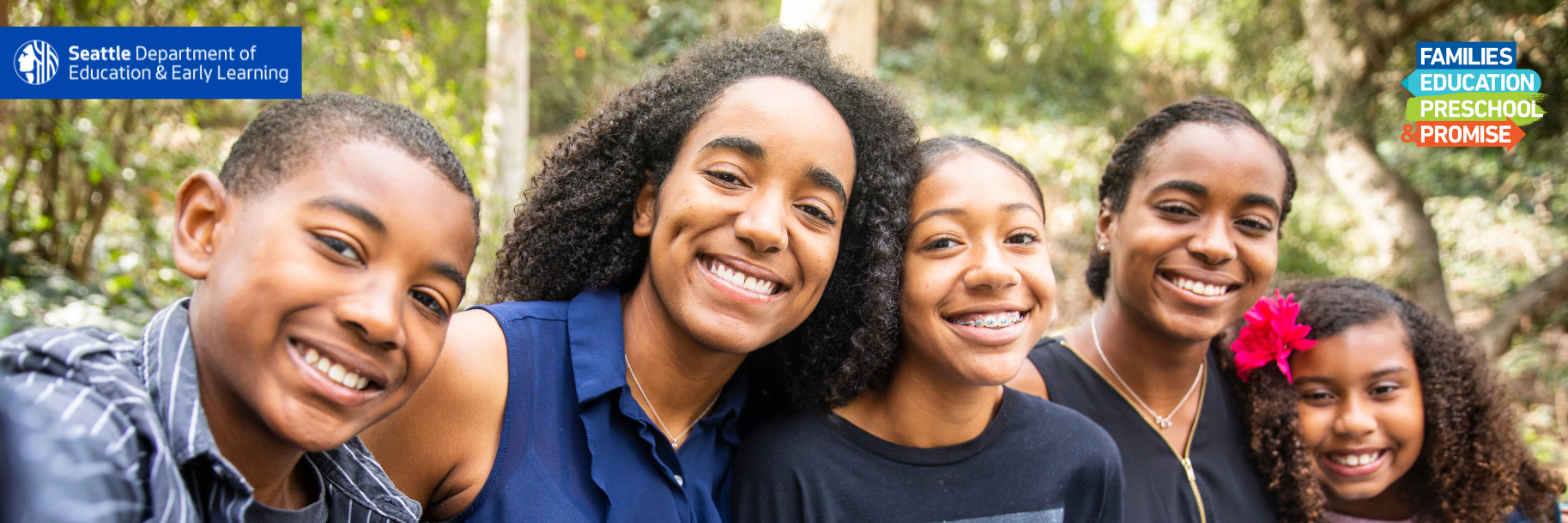 Image depicts an art project by Rainier Beach High School students about what brings them sunshine on a rainy day.
Image depicts an art project by Rainier Beach High School students about what brings them sunshine on a rainy day. FOR IMMEDIATE RELEASE
August 10, 2023
Contact: Sage Leibenson, sage.leibenson@seattle.gov, 206.507.6701
Funding awards to be announced fall 2023
SEATTLE (August 10) – As part of the City’s $4.5 million investment to increase student mental health supports in schools, the Seattle Department of Education and Early Learning (DEEL) is launching a funding process to expand services at up to three additional schools beginning fall 2023. The framework guiding service expansion was developed in partnership with students, community partners, Seattle Public Schools (SPS) staff, and Public Health—Seattle & King County (PHSKC) through a series of learning community convenings, a review of youth mental health research and data, and new student services piloted at five schools in the 2022-23 school year. Four select schools are invited to apply for up to $500,000 through a competitive funding process to implement services over two school years, through 2025. Existing pilot schools will also receive up to $500,000 through 2025 to support continuity of newly implemented services for students.
Pilot schools, and schools eligible to apply for funding, include the following:
| PILOT SCHOOLS Began implementing services in the 2022-23 school year |
| Aki Kurose Middle School → Rainier Beach High School* Denny Middle School → Chief Sealth High School* Ingraham High School |
| ADDITIONAL SCHOOLS ELIGIBLE FOR PILOT EXPANSION Eligible to apply for funding to implement services beginning fall 2023 |
| Cleveland High School Franklin High School** Garfield High School Nathan Hale High School |
**Aki Kurose Middle School has a feeder school relationship with Franklin High School.
“Addressing the mental health challenges facing our students and young people is one of our top priorities as they are the future and promise of our city,” said Mayor Bruce Harrell. “Through efforts like the Student Mental Health Supports Pilot, School-Based Health Centers, and the new Reach Out Seattle initiative focused on prevention and early intervention, we will continue to build a comprehensive approach to support the health and wellbeing of our youth and help them reach their full potential.”
Consistent with nationwide trends, the urgent need for greater access to youth mental health services in Seattle is widespread and impacts every student population and school community. A competitive funding process will be conducted to equitably direct available funding to eligible schools ready to successfully implement youth-informed, culturally affirming services for students at the highest risk of adverse mental health outcomes. Funding will increase and expand options for clinical and non-clinical mental health support at schools to prevent and reduce adverse mental health outcomes including anxiety, depression, and suicidal ideation. Schools are empowered to implement services tailored to the specific needs of their students.
LEARNINGS FROM THE 2022-2023 SCHOOL YEAR MENTAL HEALTH PILOT
The first schools to pilot services—Aki Kurose, Denny, Rainier Beach, Chief Sealth International, and Ingraham—were identified by DEEL and PHSKC based on elevated student needs and school readiness to increase services. Services included, but were not limited to, mental health screening and referrals to free community-based mental health care; case management focused on engaging students disconnected from school; and social-emotional learning activities hosted during the school day, providing culturally specific approaches to wellness and healing, facilitated by community-based providers of color.
To better understand root causes of student mental health challenges and preferences in accessing care, DEEL convened a series of four learning community convenings, six listening sessions, and five school site visits over the course of three months. Participants met regularly to describe the unique needs of their school communities and identify successes and challenges they experienced as schools worked to quickly tailor and implement services. This meeting series was comprised of:
- 13 students representing pilot schools and the Seattle Student Union
- 14 school staff
- 2 mental health experts
- 11 community partners
- 2 DEEL staff
The convenings revealed that each school community in Seattle experiences distinctive challenges affecting students’ mental well-being, with differing cultural understandings about wellness and healing, and varied ideas about how funding should be invested in their school. Alongside these differences, common themes in student needs emerged, including a need for greater access to: options in service types; adults students can talk to and trust; clinical providers of color at school; and safe spaces where youth can connect with peers, de-stress, and express themselves. Feedback also affirmed successful strategies, including: hiring school social workers trained in clinical mental health care to provide an integral link between school, home, and community; restorative practice training for school staff providing mentoring and case management to support students in healing; and providing clinicians of color to work full time at the school and offer drop-in individual and group counseling. These findings helped inform the framework needed to identify additional schools eligible for funding. A comprehensive report summarizing insights gained from 2022-23 learning communities will be released in fall 2023.
FRAMEWORK AND PROCESS FOR IDENTIFYING ADDITIONAL SCHOOLS ELIGIBLE FOR FUNDING
In addition to gathering insights through learning community meetings, DEEL conducted a needs assessment and review of mental health research and student data to better understand the landscape of youth mental health and develop a process for how to prioritize funding. Source materials included, but are not limited to, evidenced-based methods for measuring youth mental health outcomes, best practices for sustaining well-being in schools, local and national trends, Seattle school data, and student behavioral health survey responses. These findings identified gaps in culturally affirming mental health service options available at Seattle comprehensive high schools. Results from this process informed DEEL’s framework and qualitative ranking process for identifying additional schools eligible for funding. A detailed report summarizing DEEL’s needs assessment and prioritization process can be found here on our website.
The prioritization process named a total of seven high schools eligible for funding, three of which—Chief Sealth International, Ingraham, and Rainier Beach—are already receiving funding as part of the 2022-2023 mental health pilot. The remaining four schools identified—Franklin, Cleveland, Garfield, and Nathan Hale high schools—are invited to apply for funding and join the network of schools providing implementing new services as part of this investment.
Successful applicants must demonstrate their school’s capacity and readiness to successfully implement new services for students. As the investment expands to more schools, engagement with learning community participants, monitoring of program implementation, and assessment of youth mental health indicators will continue. The funding application is available now on DEEL’s website, with applications for eligible applicants due Friday, September 15, 2023. Schools approved for funding will be announced fall 2023.
BUILDING UPON EXISTING PARTNERSHIPS FOR YOUTH MENTAL HEALTH SUPPORTS
DEEL’s student mental health supports investment complements existing City-funded mental health initiatives focused on keeping youth healthy and in school. Twenty-nine SPS School-Based Health Centers—funded by the 2018 voter-approved Families, Education, Preschool, and Promise Levy—are administered and run by PHSKC and community health care providers to provide comprehensive primary medical care and mental health supports to students. Additionally, Reach Out Seattle, a new City initiative, is launching an educational awareness campaign and trainings focused on breaking the stigma around mental health, and empowering families and community members to help prevent and recognize the signs of youth behavioral health crisis.
WHAT PEOPLE ARE SAYING
Teresa Mosqueda, Budget Chair and Seattle City Councilmember, Position 8
“Students continue to lead the way in advocating for how they want their mental health, safety, and well-being supported at school. I’m excited to see youth-informed approaches to mental health expanding to serve more students at schools across our city through this investment.”
Tammy J. Morales, Seattle City Councilmember, District 2
“Young people deserve culturally responsive and affirming care in their schools. I am happy that the mental health services our students have long advocated for are being implemented and expanded to more schools. I look forward to continuing to work with DEEL to make sure we are serving as many people as possible,”
Dr. Dwane Chappelle, Director, Seattle Department of Education & Early Learning
“Students are asking for options in how they receive mental health care. They want more adults at school who share their cultural values and language, and who they can talk to and trust. This investment will expand types of available services at school, where students are most likely to access care.”
The Seattle Department of Education and Early Learning’s mission is to transform the lives of Seattle children, youth, and families through strategic investments in education. www.seattle.gov/education


